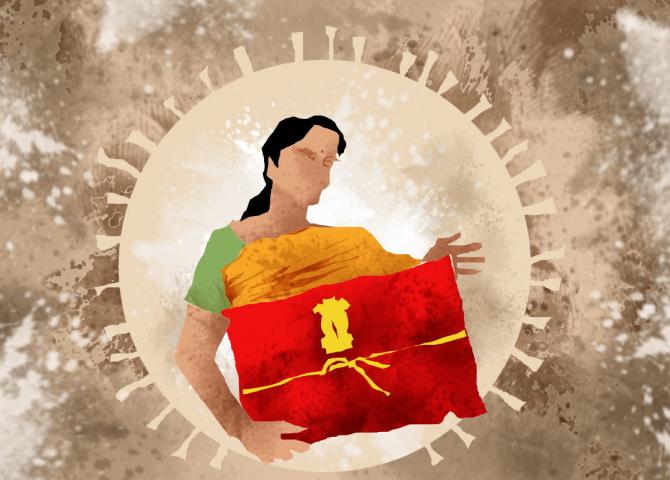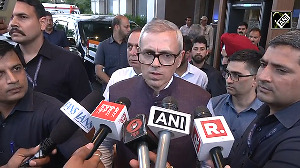'This is happening regardless of the Budget.'

According to the latest Economic Survey, a V-shaped recovery is taking place in the Indian economy.
The IMF's projection for the next fiscal year starting April 2021 is a GDP growth of 11.5%.
Finance Minister Nirmala Sitharaman's Budget has enthused the stock market.
The question is, are we really going to see a demand in the market and impressive growth?
In an exclusive interview to Rediff.com's Shobha Warrier, Dr Rakesh Mohan, president and Distinguished Fellow of the Centre for Social and Economic Progress, (formerly Brookings India), and former deputy governor, Reserve Bank of India, analyses the Indian economy, banking reforms, the RBI's role etc.
The first segment in an eloquent multi-part interview:
The finance minister and many experts say that the Budget has the elements in it to create the kind of V-shaped growth the Economic Survey talked about. Do you feel so?
Given the kind of downturn that happened because of Covid and the subsequent lockdown, one would expect a reasonable recovery which we have already seen.
But as many commentators have said, the recovery would be much more likely to be a K rather a V!
The organised sector may be experiencing a V (shaped growth), but we do not have enough information on what is happening in the informal sector.
Millions of people lost employment due to the lockdown, and it has to be revived.
But one does not have enough information on how much employment has been revived in the informal sector.
So, I would say there will be a K-shaped recovery rather than a V-shaped recovery.
This is happening regardless of the Budget.
Now the question comes to the Budget.
I would rather give a more medium and long-term view.
Regardless of the finance minister, Budgets have been suffering from a very serious long- and medium-term problem.
The gross central tax revenue has been stagnant as a proportion to GDP for more than a decade.
The gross tax revenue was 12% in 2007-2008, and has been around 10%-11% of GDP ever since.
And in the year 2019-2020, the year before the pandemic, it was less than 10%.
The point is that the Indian tax system has not been exhibiting any buoyancy whatsoever, for more than a decade, which is very strange.
We have had an average growth of at least 6% over the last decade, the pre-Covid days.
And with all the tax reforms in direct tax, indirect tax, GST, etc., there should have been some buoyancy.
Therefore, the finance minister, whoever it is, has had very little room to play with.
When the tax revenue is stagnated in proportion to GDP, you can't really increase expenditures without doing more borrowing.
We have seen that the fiscal deficit has been more than 4% of GDP in the last 4-5 years, 5.3% in 2019-2020, and it is, of course, even higher now because of Covid expenditure, lower revenue, and bringing back subsidies transparently into the budget.
So, with revenues fairly constant in proportion to GDP, the potential for the Budget to induce growth purely from the macro point of view, is very little.
The Budget is highly constrained in the expenditure side also, with committed expenditures on salaries, pensions, defence, and subsidies.
The main feature of the current Budget is the proposed increase in capital expenditure from 1.7% in 2019-2020 to the proposed 2.5% in 2021-2022.
This is very welcome as this is growth inducing though it depends on how capital expenditure is distributed, and what is being done to make sure that infrastructure projects are actually implemented fast.
But we do not have enough information on that.
The finance minister said she had prioritised investment to boost demand and create jobs. Even before the pandemic, the complaint of the industry was that there was no demand.
Do you think this b=Budget can boost demand?
If it is actually done.
But we do not have enough information.
All the statements are welcome.
Like the proposal to establish an infrastructure DFI, but then it depends on how exactly it will be implemented. The devil lies in the details!
The question is, how will this new DFI be different from the old IIFCL (Indian Infrastructure Finance Company Ltd)?
She said it would be professionally managed, which is strange as it implies the public sector banks are not professionally managed.
In fact, all the public sector institutions are supposed to be under professional management!
So, it remains to be seen how exactly they do it.
But I welcome the announcement.
I hope that they would structure it in such a way that it is not a 100% public sector company because that would restrain many activities.
My suggestion would be that they should look at the original structure of IDFC, also conceived as infrastructure DFI back in 1998.
What they did then was to keep the direct government equity to less than 50%, so that it could be classified as a private sector institution and attract high quality professionals with market compensation.
Additional equity came from international high pedigree public sector institutions like the IFC, the ADB, the government of Switzerland, the GIC of Singapore and the like.
I hope they figure a structure like that.
Feature Presentation: Aslam Hunani/Rediff.com












 © 2025
© 2025